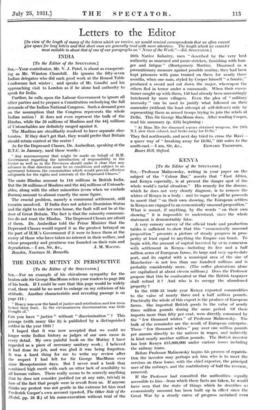THE INDIAN MUTINY IN PERSPECTIVE
[To the Editor of the SPECTATOR.]
SIR,—For an example of his chivalrous sympathy for the beaten side Sir George MacMunn refers your readers to page 202 of his book. If I could be sure that this page would be widely read, there would be no need to enlarge on my criticism of his attitude. Another characteristic and revealing passage is on page 111 :
" Heavy was now the hand of justice and retribution and few trees lacked their fruit. In the circumstances discrimination was little thought of."
Can you have " justice " without " discrimination " ? This Passage (with many like it) is published by a distinguished soldier in the year 1931 !
I hoped that it was now accepted that we could no longer write Indian history as judges of our own cause in every detail. My own painful book on the Mutiny I have regarded as a piece of necessary sanitary work ; I believed it had done its job, and was glad it was being forgotten. It was a hard thing for me to write my review after the respect I had felt for Sir George MacMunn ever since Mesopotamian days. But I never read a book that combined high merit with such an utter lack of sensibility to all human values. There really seems to be scarcely anything that he does not consider justified (or at any rate, trivial) in face of the fact that people were in revolt from us. If anyone thinks my protest was not gentle in the extreme let him read Frederick Cooper's own account (quoted, The Other Side of the Medal, pp. 58 ff.) of his mass-execution without trial of the 26th Native Infantry, men " described by the very best authority as unarmed and panic-stricken, famishing with hun- ger and fatigue " (Montgomery Martin). Disarmed as a precautionary measure against possible mutiny, they had been kept prisoners with guns trained on them for nearly three months, when one man, styled by Cooper himself " a fanatic," produced a sword and cut down the major, whereupon the others fled in terror under a cannonade. When their execu- tioner caught up with them, 150 had already been unresistingly butchered by mere villagers. Even the plea of " military necessity " can be used to justify what followed on their surrender (without the least attempt at self-defence) only by representing them as armed troops trying to join the rebels at Delhi. This Sir George MacMunn does. After reading Cooper, read his summary (p. 253) beginning :
" At Mian Mir the disarmed sopoys obtained weapons, the 20th N.I. slew their colonel, and broke away for Delhi."
They fled northwards, and next day tried to cross the Ravi--a queer way of " breaking away for Delhi," 800 miles to the Boars Hill, Oxford.










































 Previous page
Previous page